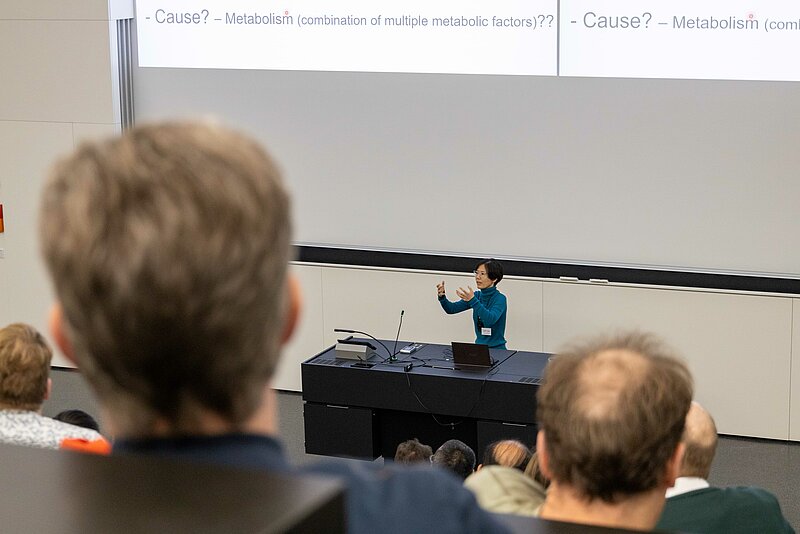On October 17, 2024, Professor Miki Ebisuya, a co-speaker of the Cluster of Excellence, Physics of Life (PoL), gave her university-wide inaugural lecture at Technische Universität Dresden. Appointed as a Humboldt Professor and Chair of Cell and Tissue Control in 2023, Prof. Ebisuya fascinated over 60 attendees with her lecture, titled “In search of a global modulator for biological tempo across animal species”.
From an early age, Prof. Ebisuya has always been fascinated by the concept of biological time. Inspired by the book Elephant Time and Mouse Time by Tatsuo Motokawa, she sought to understand why animals experience such vast differences in lifespan, gestation periods, and even heart rates. For example, while a mouse lives around two years, an elephant can live for seventy. These striking differences fuelled her curiosity to explore how and why the biological clocks of organisms differ so vastly.
Prof. Ebisuya and her team have since made groundbreaking strides in this area of research. By using stem cells from various species—including mice, rhinos, marmosets, rabbits, and humans—they have created a “stem cell zoo” in the lab, allowing them to replicate species-specific biological tempos. This approach enables her group to observe how tissues develop in a controlled setting, mirroring embryonic processes. A particularly fascinating aspect of her work involves studying the division of the body into repetitive segments during development, driven by oscillating gene expression patterns called the segmentation clock.
Prof. Ebisuya found differences in segmentation clock periods between humans and other species of mammals such as mice and rhinoceros. This segmentation clock can be used as a proxy for the speed of embryogenesis and development of an organism. Interestingly, humans not only have a slower segmentation clock, but tend to show slower protein degradation in all cellular compartments, which may potentially be due to metabolic differences. Miki’s group are continuing to investigate the mechanisms behind these inter-species differences, and developing new tools and models to advance the field in the process.
Prof. Ebisuya also highlighted a novel study by her group harnessing bovine stem cells to develop lab-grown beef steak, by inducing skeletal muscle and endothelial cells at the same time. Cells were able to self-organise in culture, and presented with integrated vessel-like structures. This is an important milestone in developing an alternative to traditional sources of meat, and highlights how the stem cell zoo and its derivatives can have highly relevant real-world applications.
Overall, attendees left the lecture with a fresh perspective on how stem cell research can uncover developmental processes across species. We extend our heartfelt congratulations to Professor Ebisuya on her inspiring lecture and look forward to further exciting discoveries by her group in future!
